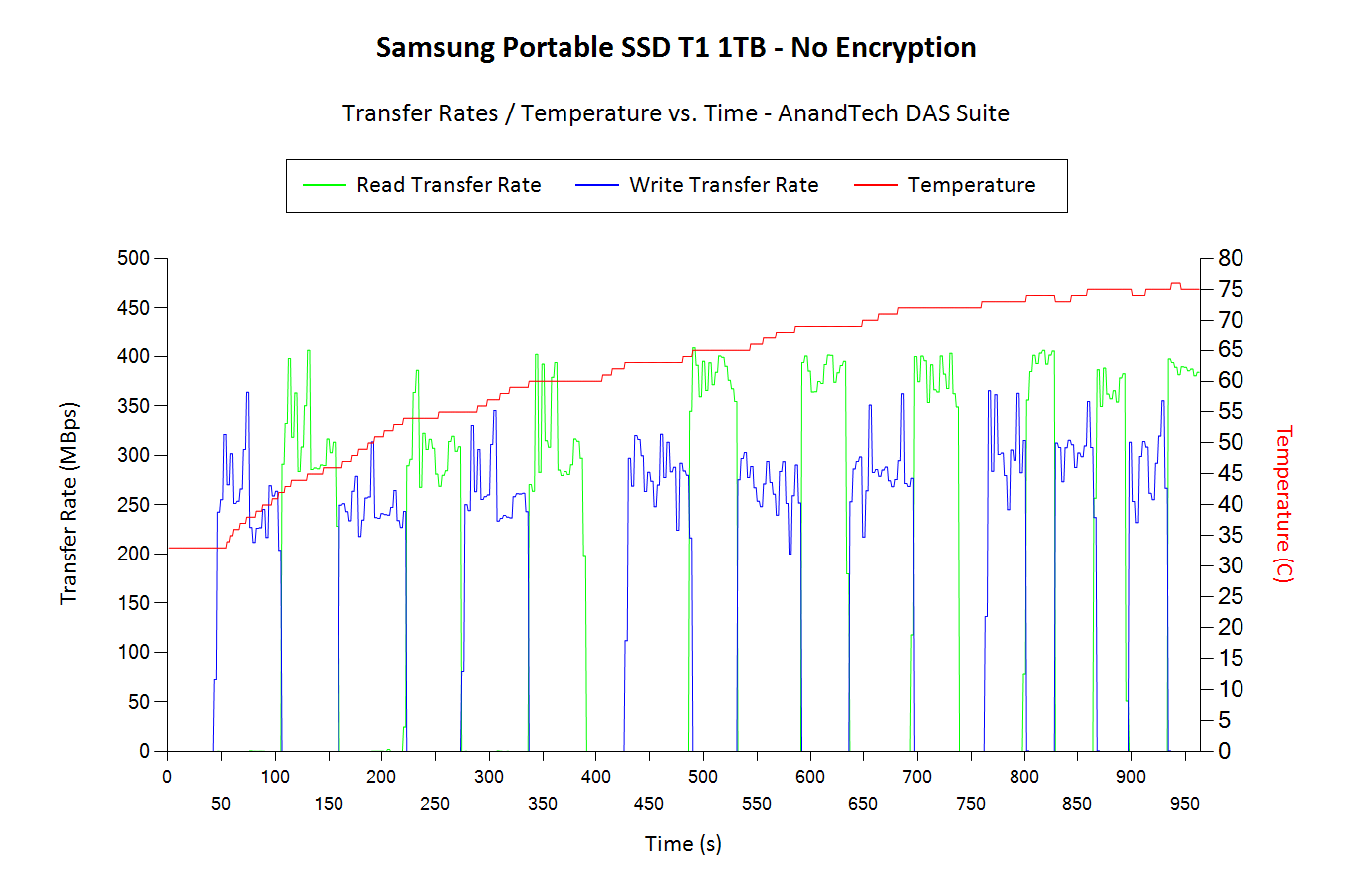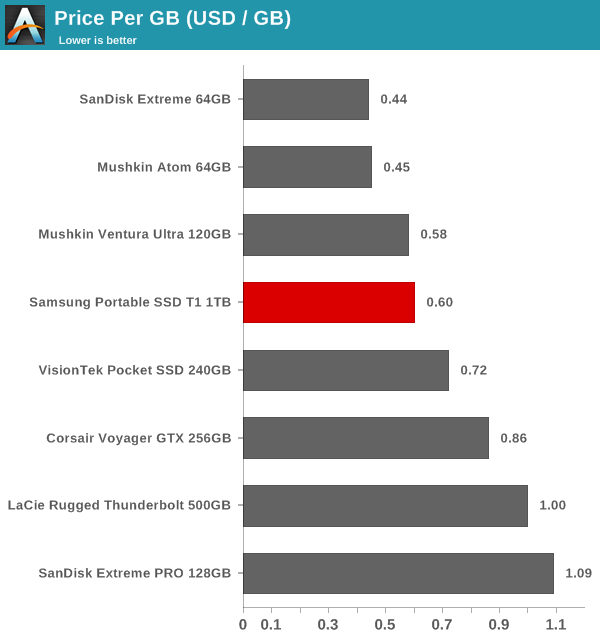Samsung Portable SSD T1 Review
by Ganesh T S on January 20, 2015 10:00 AM ESTPerformance Consistency and Concluding Remarks
Yet another interesting aspect of these types of units is performance consistency. Aspects that may influence this include thermal throttling and firmware caps on access rates to avoid overheating or other similar scenarios. This aspect is an important one, as the last thing that users want to see when copying over, say, 100 GB of data to the external portable SSD, is the transfer rate going to USB 2.0 speeds. In order to identify whether the drive under test suffers from this problem, we instrumented our robocopy DAS benchmark suite to record the flash drive's read and write transfer rates while the robocopy process took place in the background. For supported drives, we also recorded the internal temperature of the drive during the process. The graphs below show the speeds observed during our real-world DAS suite processing. The first three sets of writes and reads correspond to the photos suite. A small gap (for the transfer of the videos suite from the primary drive to the RAM drive) is followed by three sets for the next data set. Another small RAM-drive transfer gap is followed by three sets for the Blu-ray folder.
An important point to note here is that each of the first three blue and green areas correspond to 15.6 GB of writes and reads respectively. For the Samsung Portable SSD T1, we see throttling kick in only after more than 200 GB of data has been transferred continuously (the last two sets of reads in the graph below). The throttling seems to kick in after the drive temperature reaches 75 C. Another interesting aspect is the fact that the temperature rises a bit faster in the case where encryption is enabled.

A Note on TRIM
TRIM support would be really handy for a portable SSD. Usually, we don't see TRIM working over USB. However, the Corsair Voyager GTX with the Phison controller does support TRIM over the USB 3.0 interface. In addition, that drive also supports manual overprovisioning. The T1 has in-built overprovisioning, but manual control over it using the Samsung Magician software would also be nice. Of course, it is also arguable that TRIM and overprovisioning are not really needed for the T1's target market. However, for cases where the T1 is used as a portable OS drive (Windows-To-Go or some sort of portable Linux install), those features could improve user experience.
The internal platform of the T1 (the 850 EVO) does support TRIM. However, Samsung indicated that neither Microsoft nor Apple currently support issuing TRIM commands through the USB interface on their current OS. That said, they are exploring additional methods of forcing TRIM - including manually through the Samsung SSD Magician software. That feature will not be available in time for the launch, though.
Concluding Remarks
Coming to the business end of the review, the Portable SSD T1 brings Samsung to the forefront of external flash drive solution vendors. Keeping the flash fabrication, controller design and fabrication as well as the solution design in-house has enabled it to put out the most reasonably priced (if not, the only) 1TB external flash drive product in the market. The size and weight of the unit are both small enough to actually let the drive hang off the USB 3.0 port as a flash drive. That said, Samsung supplies a very short USB 3.0 cable - it is perfect for notebooks, but not so in the case of desktops with USB ports in the front or rear panels.
The performance of the drive leaves us with no doubt that it would be a great portable OS drive / Windows-to-Go solution, even though Samsung doesn't advertise it for that purpose. Unfortunately, Samsung has not decided to pursue the certification process. As far as non-enterprise consumers go, this is perfectly acceptable - the performance for Windows-to-Go is there without the extra cost associated with obtaining the certification that eventually gets passed on to them.
The only minor points of concern is the inability to recognize and take actions on the drive based on S.M.A.R.T features such as TRIM.

The 1TB 840 EVO mSATA SSD has been in the market for quite some time now. Hence, the size of the Portable SSD T1 didn't come as much of a surprise. From an end-user perspective, the size / capacity of the drive and the price point ($0.60/GB) are very attractive. The Portable SSD T1 makes for a compelling solution where fast transfers of large amounts of data is needed in a secure environment.










68 Comments
View All Comments
ArsonW - Tuesday, January 20, 2015 - link
SSDs don't get very hot so this is a non-issue.Laststop311 - Wednesday, January 21, 2015 - link
ssd's only pull like 5 watts at peak and most of the time when in use is around the 3 watt range. Thats very little wattage to produce heat. I don't think overheating is a concern. The test showed no throttling.Laststop311 - Wednesday, January 21, 2015 - link
Also the only reason this ssd went up to 75C is because they hit it with a non stop 15 minutes of heavy writes and reads. The majority of the SSD's usage will not be that heavy so it's not like its going to be running at 75 everytime you use it. Stays at 60 and below for the first 5 minutes of putting it on 100% loadextide - Wednesday, January 21, 2015 - link
75c is nothing. 'Commercial heat grade" which is basically the lowest heat grade goes up to 85c, and industrial grades can be specced as high as 125c.tipoo - Friday, January 30, 2015 - link
I doubt even heavy real world use would see that, as there would be idle times, if even for fractions of a second. This was very much a worst case test, with continuous IO with no breaks which the drive is unlikely to see. Anyways, CPUs can hit 105 degrees Celsius now before their shutoff point I think, 75 doesn't even seem that bad for this, I'll give Sammy the benefit of the doubt and assume the chip was rated high enough that the max temp isn't an issue.Laststop311 - Wednesday, January 21, 2015 - link
so any of those external drives you get, even if they had trim they still will be slower than this samsung. This drive is now king of external usb 3.0 drives. It's the fastest external usb 3.0 drive in any possible scenario. Your voyager gtx will get beat by this drive even on this drives worse day vs voyager gtx's best day.slillo - Thursday, January 22, 2015 - link
Nice write up.Gigaplex - Tuesday, January 20, 2015 - link
"After installation, the 128 MB partition disappeared, and the 1 TB volume was made visible. The Samsung SSD program / daemon continues to run in the background and allows for altering the security option (encryption) without reformatting the partition"Great, a portable drive that doesn't sound like it can be ported to Apple or Linux systems, and may have portability issues between different Windows systems if it's encrypted.
You also mention several times how this drive would be good for Windows To Go. Did you test it? Windows To Go has very strict requirements on what types of drives it will work with. There are only a select few drives on the market that have been validated to work with it.
mczak - Tuesday, January 20, 2015 - link
Well there's a Mac installer. I think if you disable encryption it will work everywhere. Though I guess to run it with linux you'd need to first set it up using either windows or osx, which isn't great (imho would be much better to just ship that as an ordinary drive where you can optionally install whatever magic software...).AJSB - Wednesday, January 21, 2015 - link
I believe ,but i'm not 100% sure, that you can do it with Gparted "Live CD" in a USB Pen.It should find any hidden partitions and delete them or simply create a new partition table that will erase everything.
PS: My personnal experience with HDDs and USB Flash Pens....dunno about SSDs.